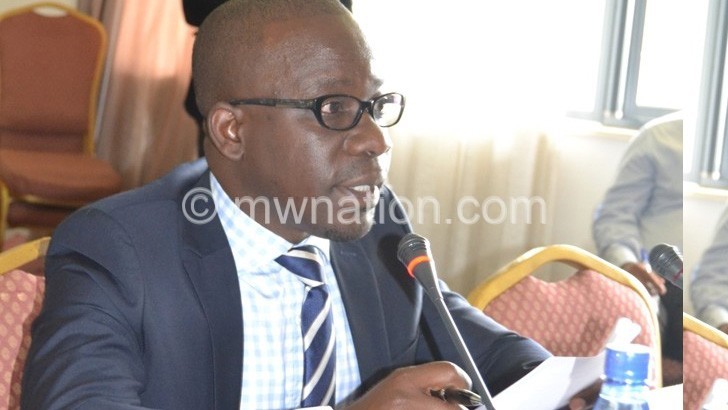ODDP has issues with Fisp list
The Office of Director of Public Procurement (ODPP) has hinted that there could be issues with the list of successful bidders for this year’s Farm Input Subsidy Programme (Fisp) hence the delay in issuing a No Objection order.
The Smallholder Farmers Revolving Fund of Malawi (SFRFFM) which government designated to manage the programme, sent the list to the ODPP for a No Objection on August 1 2017 and all things being equal, the latter should have issued the order before the expiry of 10 days.

But the 10-day allowable period that the office is expected to review the list of successful bidders before issuing the No Objection order expired on August 15, 2017.
When asked about the delay to issue the No Objection order, ODPP director Paul Taulo explained on Thursday that such hold-ups are mostly necessitated when there are issues with the submitted list.
According to him, the system allows for 10 working days for processing of a submission from the day of receipt of the documentation as the allowable time for the ODPP to come up with a determination of the entire process.
“In situations where there are issues to be clarified by the procuring entities or other institutions involved in the procurement or that there is need for extra information, necessary advice is needed before granting the No Objection.
Taulo said this is done to ensure compliance with the Public Procurement Law and this back-and-forth correspondence may therefore stretch the 10 days further.
Said Taulo: “Notwithstanding this information, please note that the submissions made by the Procuring Entities (PEs) to the ODPP and their clearance thereof fall within the evaluation process, and according to our procurement legal framework this stage of procurement cycle is confidential and cannot be shared with the public.
“You may also wish to know that, the fact that a submission has been made to this office does not guarantee that it will receive a No Objection. This is true in the case where this office is satisfied that a PE did not comply with the regulatory framework in the procurement process,” said Taulo in response to our questionnaire on Thursday.
Ordinarily, the PEs are responsible for developing and issuing the bid documents for their respective procurements to bidders. They also have a responsibility to include in the bid document clauses or instructions regarding the bidders’ past performance and conduct including corruption issues, among others, in accordance with the provisions of the Public Procurement Law.
The ODPP head added that bidders have the obligation to satisfy these requirements and PEs have a further responsibility for due diligence to ensure that the bidders comply with the instructions.
Said Taulo: “[But] the integrity and performance of bidders are evaluation factors and, therefore, discussing them in the press would prejudice the evaluation process.”
SFFRFM chief executive officer Andy Kalinde said yesterday the delays in issuing No Objection orders will not affect implementation of the programme because only those bidders that are unsuccessful will be taken out from the list and the rest will be awarded contracts.
On Tuesday this week, the Parliamentary Committee on Agriculture, Irrigation and Water Development queried SFFRFM on reports that some companies that failed to effectively supply inputs during last year’s Fisp have been awarded contracts again this year.
The lawmakers demanded that before the official list of successful bidders is released, the committee should also be given an opportunity to do some vetting because it has reservations with some suppliers.
According to a document of successful bidders which we have seen, at least 21 private companies have been identified and are currently being scrutinized both by ODPP and the Anti-Corruption Bureau (ACB).
The document shows that this year’s suppliers are Transglobe Export Produce Ltd, Agro Input Suppliers Ltd, Rab Processors Ltd, Optichem (2000) Ltd, Agora Ltd, Farmers World Ltd, Malawi Fertilizer Company Ltd, A.L. Ltd, Midima Holdings Ltd, Paramount Holdings Ltd and Agricultural Trading Company (ATC).
Others are Initial Suppliers, Dalitso General Suppliers Ltd, ETG Inputs Ltd, Simama General Dealers, Kulima Gold Ltd, KU Distributors Ltd, Worldwide Wholesalers Ltd, Nyiombo Investments Ltd, Mas International and Lords Best Collection. This list is out of the 32 firms that submitted bids to participate in the programme.
Details are sketchy on which companies did not effectively fulfill the requirements of the contracts. But in February this year, the joint Parliamentary Committee chairperson Joseph Chidanti Malunga said it would summon 27 private companies to explain alleged irregularities.
Civil Society Agricultural Network (Cisanet) has cautioned government not to allow suppliers that did not deliver as per their contract last year to participate in this year’s programme.
Cisanet national director Pamela Kuwali said in an interview that private sector participation in Fisp needs to be on merit to make the programme successful.
Said Kuwali: “Maintaining those that failed last year is a recipe to the underperformance of the programme. Additionally, it raises suspicion on the criteria of their consideration.”
In 2017/18 financial year, Minister of Finance, Economic Planning and Development Goodall Gondwe allocated K43.5 billion to the programme up from K40 billion the previous year.
Under the programme, the 900 beneficiaries last year received coupons with a government subsidy value of K15 000 and a beneficiary had to top up the amount private contracted suppliers charged for a bag of fertilizer. The top-up per bag ranged between K6 000 and K8 000.
The programme has over the years been dogged with a lot of irregularities which included late, insufficient or no delivery of fertilisers to beneficiaries. In the wake of the problems, the Economics Association of Malawi and opposition political parties, notably the main opposition Malawi Congress Party (MCP), have been asking government to phase out Fisp as it has not produced results and instead should go for a universal subsidy programme.





